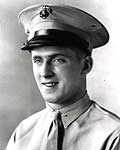 For Corporal Charles Joseph Berry, March 3, 1945 was just another day in the trenches…at least that was how it began. By days end, the war would be all over for Corporal Berry…as would his life. At this point, many people would expect that Corporal Berry would be “just another war statistic,” and they would be right, to a small degree. Corporal Berry was a war statistic, but it was the way he died that changed everything…that made him a hero!!
For Corporal Charles Joseph Berry, March 3, 1945 was just another day in the trenches…at least that was how it began. By days end, the war would be all over for Corporal Berry…as would his life. At this point, many people would expect that Corporal Berry would be “just another war statistic,” and they would be right, to a small degree. Corporal Berry was a war statistic, but it was the way he died that changed everything…that made him a hero!!
Charles Joseph Berry was born on July 10, 1923 in Lorain, Ohio, and graduated from Clearview High School in Lorain in 1941. After graduation he went to work as a truck driver for a moving company. When World War II broke out, Corporal Berry enlisted in the Marine Corps in Cleveland, Ohio, on October 1, 1941. He was 18 years old. He was sent to Parris Island, South Carolina for basic training. Following his basic training, he was stationed to the Marine Barracks at Quantico, Virginia, but shortly afterwards was ordered to the Marine Barracks, New River, North Carolina, for parachute training. He was promoted to private first class on June 2, 1942, after qualifying as a parachutist.
On March 11, 1943, PFC Berry sailed from San Diego, California, arriving later that month in New Caledonia with the 1st Parachute Battalion. He left New Caledonia in September 1943, arriving in the Solomon Islands a few weeks after his departure. Then, in October 1943, he went to Vella La Vella, where he remained for one month. In November 1943, he landed at Bougainville, and during that campaign, took part in the raid at Koairi Beach and in the Empress Augusta Bay action. Prior to returning to the United States in February 1944, he spent a short time at Guadalcanal. Following his arrival at Camp Elliott, San Diego, he joined the newly organized 5th Marine Division in early 1944. In July he departed for the Hawaiian Islands with that division. He was advanced to corporal on July 22, 1944. He landed on Iwo Jima on D-Day, February 19, 1945.
On March 3, 1945, Corporal Berry was killed during a battle that would win him the Medal of Honor. Corporal Berry while stationed in the front lines, manned his weapon with alert readiness as he maintained a constant vigil with other members of his guncrew during the hazardous night hours of March 2nd. Infiltrating Japanese soldiers launched a surprise attack shortly after midnight in an attempt to overrun his position. Corporal Berry engaged in a pitched hand-grenade duel, returning the dangerous weapons with prompt and deadly accuracy until an enemy grenade landed in the foxhole. Corporal Berry gave no thought to his own safety, but determined to save his comrades, he unhesitatingly chose to sacrifice himself and immediately dived on the deadly grenade. His body absorbed the shattering violence of the exploding charge, and protected the others from serious injury. Corporal Berry had never given it another thought. He just did it, and then it was all over. He gave his life so that his fellow marines might carry on the relentless battle against a ruthless enemy, and “his superb valor and unfaltering devotion to duty in the face of certain death reflect the highest credit upon himself and upon the United States Naval Service.”
Corporal Berry was buried in the 5th Marine Division Cemetery on Iwo Jima, but was later reinterred in Elmwood Cemetery, Lorain, Ohio, in 1948. He was honored for “conspicuous gallantry and intrepidity at the risk of his life above and beyond the call of duty” as a member of a machine-gun crew, serving with the 1st Battalion, 26th Marines, 5th Marine.


Leave a Reply